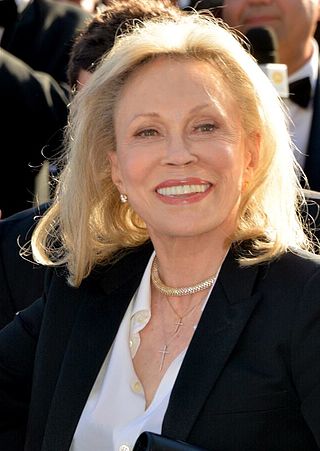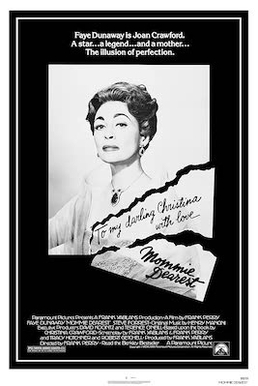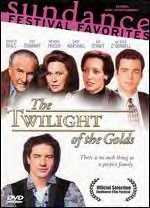
Henry Warren Beatty is an American actor and filmmaker. His career has spanned over six decades, and he has received numerous accolades, including an Academy Award and three Golden Globe Awards. He also received the Irving G. Thalberg Award in 1999, the BAFTA Fellowship in 2002, the Kennedy Center Honors in 2004, the Cecil B. DeMille Award in 2007, and the AFI Life Achievement Award in 2008.

Dorothy Faye Dunaway is an American actress. She is the recipient of many accolades, including an Academy Award, a Primetime Emmy Award, three Golden Globe Awards, and a BAFTA Award. In 2011, the government of France made her an Officer of the Order of Arts and Letters.

Network is a 1976 American satirical drama film produced by Metro-Goldwyn-Mayer, written by Paddy Chayefsky and directed by Sidney Lumet. It is about a fictional television network, the Union Broadcasting System, and its struggle with poor ratings. The film stars Faye Dunaway, William Holden, Peter Finch, Robert Duvall, Wesley Addy, Ned Beatty, and Beatrice Straight.

Winifred Jacqueline Fraser BissetLdH is a British actress. She began her film career in 1965 and first came to prominence in 1968 with roles in The Detective, Bullitt, and The Sweet Ride, for which she received a Golden Globe nomination as Most Promising Newcomer. In the 1970s, she starred in Airport (1970), The Mephisto Waltz (1971), Day for Night (1973), which won the Academy Award for Best Foreign Language Film, Le Magnifique (1973), Murder on the Orient Express (1974), St. Ives (1976), The Deep (1977), The Greek Tycoon (1978) and Who Is Killing the Great Chefs of Europe? (1978), which earned her a Golden Globe nomination as Best Actress – Motion Picture Comedy or Musical.

Gia is a 1998 American biographical drama television film about the life and times of one of the first supermodels, Gia Carangi. The film stars Angelina Jolie as Gia and Faye Dunaway as Wilhelmina Cooper, with Mercedes Ruehl and Elizabeth Mitchell. It was directed by Michael Cristofer and written by Cristofer and Jay McInerney. The original music score was composed by Terence Blanchard.

Mommie Dearest is a 1981 American biographical psychological drama film directed by Frank Perry and starring Faye Dunaway, Steve Forrest, Mara Hobel, and Diana Scarwid, with supporting performances from Xander Berkeley in his feature film debut along with Rutanya Alda and Jocelyn Brando. Adapted from Christina Crawford's 1978 autobiography of the same name, the film follows her and her brother Christopher's upbringing under their adoptive mother, actress Joan Crawford, depicting her as abusive, controlling, and manipulative, prioritizing her Hollywood career over her family.
Steven Williams is an American actor in films and television. He is known for his roles as Captain Adam Fuller on 21 Jump Street, Lt. Jefferson Burnett on The Equalizer, Det. August Brooks on L.A. Heat, X on The X-Files, Russell "Linc" Lincoln in Linc's, and Rufus Turner in Supernatural.
The 60th Golden Globe Awards, honoring the best in film and television for 2002, were held on January 19, 2003, in the Beverly Hilton Hotel, Beverly Hills, California. The nominations were announced on December 19, 2002.
The 55th Golden Globe Awards, honoring the best in film and television for 1997, were held on January 18, 1998. The nominations were announced on December 18, 1997.

The Three Musketeers (also known as The Three Musketeers (The Queen's Diamonds)) is a 1973 swashbuckler film based on the 1844 novel by Alexandre Dumas. It is directed by Richard Lester from a screenplay by George MacDonald Fraser, and produced by Ilya Salkind. It stars Michael York, Oliver Reed, Frank Finlay, and Richard Chamberlain as the titular musketeers, with Raquel Welch, Geraldine Chaplin, Jean-Pierre Cassel, Charlton Heston, Faye Dunaway, Christopher Lee, Simon Ward, Georges Wilson and Spike Milligan.
David Marshall Grant is an American actor, singer and writer.

That Certain Summer is a 1972 American made-for-television drama film directed by Lamont Johnson. The teleplay by Richard Levinson and William Link was considered the first sympathetic depiction of gay people on American television. Produced by Universal Television, it was broadcast as an ABC Movie of the Week on November 1, 1972, and received a number of television awards and nominations. The movie was also recognized as being the first network drama to depict a stable, same-sex couple; the first to depict a gay parent; and the first gay themed show to win an Emmy, with Scott Jacoby winning for his performance. A novelization of the film written by Burton Wohl was published by Bantam Books.
The Twilight of the Golds is a play by Jonathan Tolins and produced by Charles H. Duggan that premiered at the Pasadena Playhouse on January 17, 1993. Strong reviews propelled it to theatres across the country including a stop at The Kennedy Center. After fifteen previews, the Broadway theatre production, directed by Arvin Brown, opened on October 21, 1993 at the Booth Theatre, where it ran for 29 performances. The cast included Jennifer Grey as Suzanne, Raphael Sbarge as David, David Groh as Walter, Judith Scarpone as Phyllis and Michael Spound as Rob. The play had received strong reviews across the country but was "largely clobbered" when it reached Broadway.

Blind Faith is a 1998 American made-for-television drama film directed by Ernest R. Dickerson. The movie stars Charles S. Dutton, Courtney B. Vance, Kadeem Hardison, Garland Whitt and Lonette McKee. It premiered in January 1998 on Showtime. The film's screenplay was nominated for an Independent Spirit Award, while Dutton received two nominations for awards, and Vance garnered one nomination. Set in the 1950s, during a murder trial, the film deals with themes of racism and homophobia.
Denise Faye Greenbaum is an American actress, dancer, choreographer, and director. She is the recipient of an American Choreography Award, as well as a Screen Actor's Guild Award for the 2002 film Chicago. Faye won the Dance Track Magazine Artist Award for best choreography in a feature film for her work in Burlesque. Additionally, she received nominations including the Fred and Adele Astaire Award and The World Dance Awards for her choreography in Burlesque.
"The Boys in the Bar" is the sixteenth episode of the first season of the American situation comedy television series Cheers. It originally aired on January 27, 1983, on NBC in the continental U.S. and on February 10, 1983 in Alaska. It is co-written by Ken Levine and David Isaacs and directed by James Burrows. This episode's narrative deals with homosexuality, coming out, and homophobia. It was inspired by the coming out story of former Los Angeles Dodgers baseball player, Glenn Burke. In this episode, Sam's former teammate, Tom—portrayed by Alan Autry—reveals his homosexuality and Sam slowly becomes supportive of him. The bar's regular customers express their disdain toward Sam's support and fear that because of Sam's support of Tom, the bar will become a place full of homosexuals. The episode's Nielsen ratings at its initial airing were low but improved after subsequent airings on NBC. This episode has received more attention since.

Faye Dunaway is an American actress who appeared in over seventy films, thirty television shows, thirteen plays and two music videos. Regarded as one of the greatest actresses of her generation, she was one of the leading actresses during the golden age of New Hollywood. After her film debut The Happening, she starred in the gangster film Bonnie and Clyde, in which she was nominated for the Academy Award for Best Actress. She starred with Steve McQueen in The Thomas Crown Affair (1968). In 1969, she co-starred with Kirk Douglas in Elia Kazan's drama The Arrangement. The following year, she starred with Dustin Hoffman in Little Big Man. In 1970, her performance in Jerry Schatzberg's experimental drama Puzzle of a Downfall Child earned her a Golden Globe nomination for Best Actress – Motion Picture Drama. She portrayed Milady de Winter in Richard Lester's The Three Musketeers (1973) and The Four Musketeers (1974).









